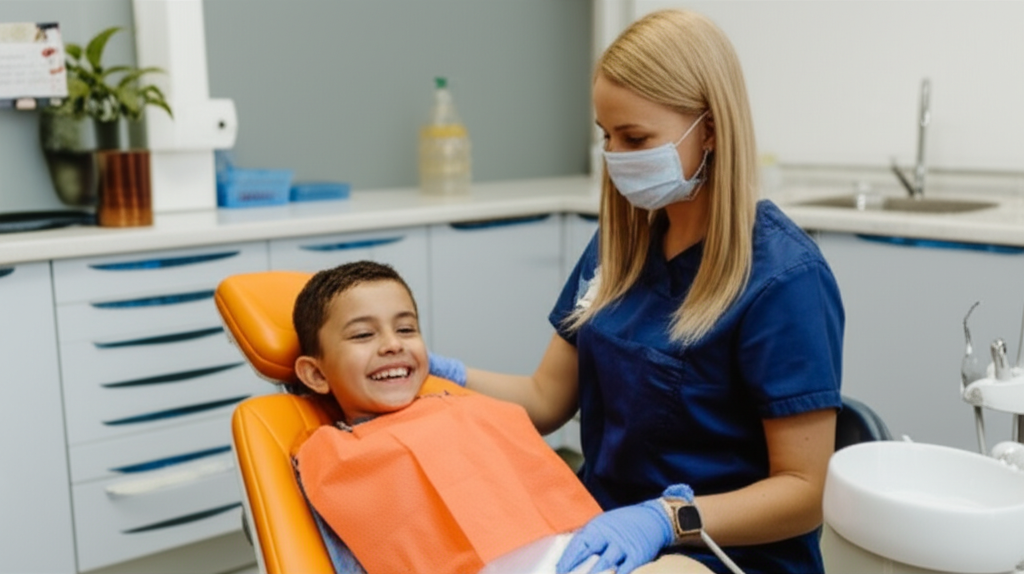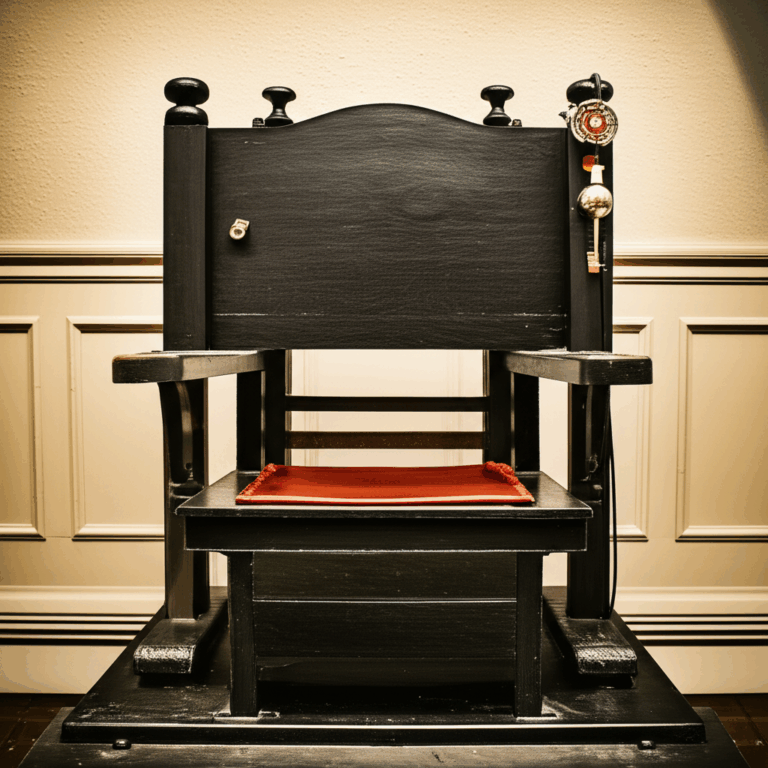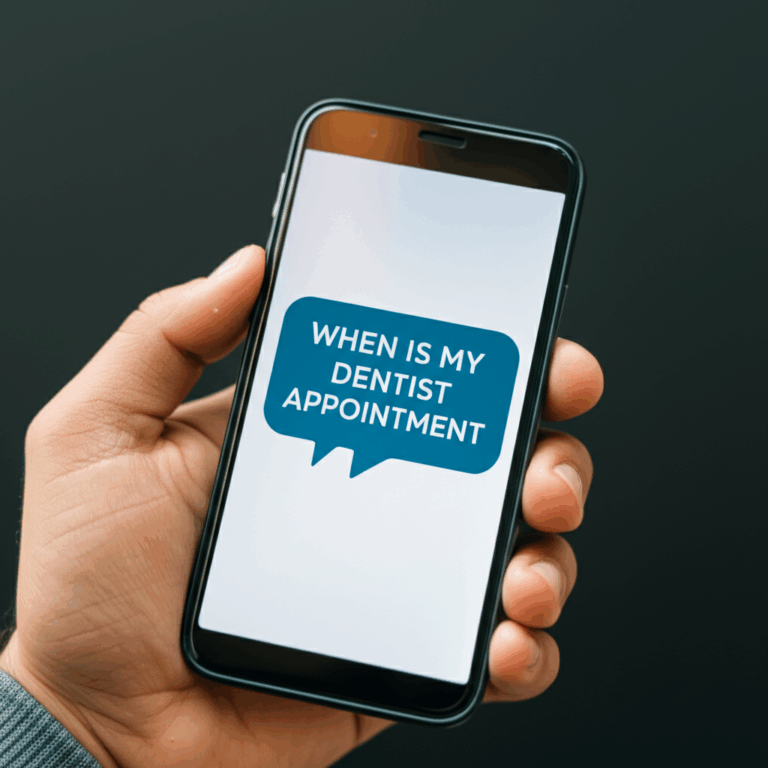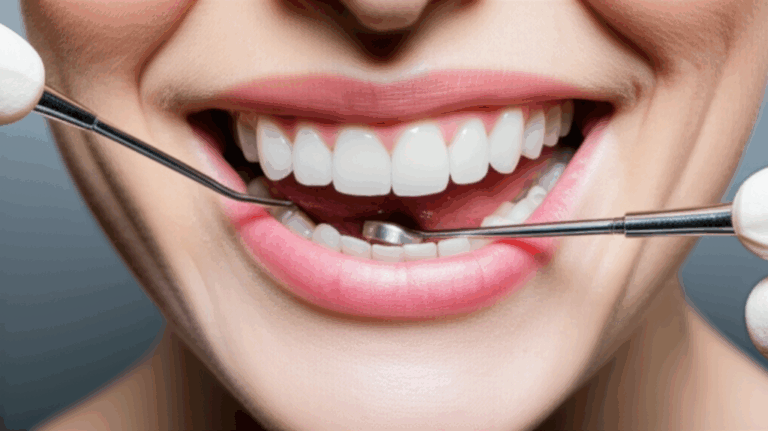
Why Choose a Pediatric Dentist? The Complete Guide for Parents Who Want the Best for Their Child’s Smile
That first little tooth poking through your baby’s gums feels like a big moment, doesn’t it? From that adorable toothless smile to the first wiggly tooth, your child’s smile keeps growing and changing. As a parent, you want the best care for every stage—but you might wonder:
Why should I pick a pediatric dentist for my child instead of just going to a general or family dentist? Is it really better?
If you’ve ever asked yourself that question, you’re not alone. Let’s talk about what makes pediatric dentists such a good choice for kids—and how they can set your child up for a lifetime of healthy, happy teeth.
In This Article
- The Important Role of Pediatric Dentists: Why It Matters
- Special Training: What Makes Pediatric Dentists Different?
- Building Trust: How a Kid-Friendly Dental Office Helps
- Preventing Problems: Giving Kids a Good Start
- Helping Kids With Special Needs and Tough Situations
- The Dental Home: Growing Up With the Same Dentist
- Key Points: Why Pediatric Dentists Are a Great Choice
- What to Do Next: Easy Steps for Parents
The Important Role of Pediatric Dentists: Why It Matters
It’s easy to think, “Teeth are teeth—what’s so hard about treating kids?” But the truth is, children’s mouths are always changing—baby teeth coming and going, new teeth coming in, jaws growing, habits starting, sometimes fears popping up.
A pediatric dentist isn’t just a regular dentist who likes kids—they’re specially trained experts in taking care of children’s teeth, from babies all the way through teenagers.
Meet the Experts for Little Smiles
A pediatric dentist is a dental expert who’s gone through two to three more years of special training after dental school. During this time, they learn about:
- Baby teeth and how to care for them
- How kids grow and change
- Best ways to make kids feel safe and happy at the dentist
- Special tools and treatments made just for children
When your child is worried, scared, or needs extra care, that extra training really matters.
A Quick Reality Check
Did you know that one in five kids ages 2 to 5 has tooth decay that isn’t fixed? And the rate goes up to half of kids aged 6 to 8 (CDC). Problems like cavities, thumb-sucking, or losing teeth too early can lead to much bigger problems if they aren’t treated early—and pediatric dentists know how to spot and stop these issues before they get worse.
Special Training: What Makes Pediatric Dentists Different?
More Years, More Know-How
If general dentists are like family doctors, pediatric dentists are like the kids’ doctors (pediatricians) of the dental world. After dental school, they spend two to three more years learning all about:
- How baby and adult teeth grow in
- The different needs of babies, kids, and teenagers—including those with health problems or special needs
- How kids think and behave, and how to talk to them when they’re afraid
Simply put: General dentists know teeth, but pediatric dentists focus on how kids’ mouths grow—from the start.
Watching Growth: Not Just Cleaning Teeth
Pediatric dental visits aren’t just about counting teeth and handing out stickers. When you see a pediatric dentist, they’re:
- Watching to make sure teeth are coming in at the right time
- Spotting early signs of crooked teeth or problems with the jaw
- Treating things that happen mostly to kids, like tooth decay from bottles and falls while playing
Kids are always changing, and pediatric dentists are really good at making sure your child’s mouth grows the way it should.
Tools and a Special Way With Kids
Have you ever seen your child get nervous about sitting in a big dental chair or hearing a loud sound? Pediatric dental offices use:
- Smaller, child-sized tools
- X-ray machines made for kids (safer and more comfortable)
- Gentle toothbrushes, flavored toothpastes, and fun things to keep kids busy
Everything is picked to help kids feel safe—not scared.
Building Trust: How a Kid-Friendly Dental Office Helps
A Place Where Kids Actually Like Going
Walk into most pediatric dental offices, and you’ll feel it right away: This is a place for kids.
Bright colors, toys in the waiting room, TVs on the ceiling—everything is done to make kids feel welcome.
But it’s not just about looking fun.
A calm, happy office can help kids think of dentist visits as a normal, even fun part of life.
Why Are Pediatric Dentists So Good With Kids?
Their training is about more than teeth—they learn about how kids think and feel. In real life, this looks like:
- Using “Tell-Show-Do”—they tell, show, and then do the step, so kids know what’s coming
- Giving lots of praise and encouragement
- Using toys, movies, or just talking to keep kids busy and relaxed
- Talking to kids in a way that makes sense to them
Because of this gentle approach, kids who see pediatric dentists are usually less nervous and more willing to let the dentist help them.
Imagine your child actually looking forward to seeing the dentist. It really can happen.
Changing Fear to Confidence
Being scared of the dentist is hard for kids—and for parents! Pediatric dentists have lots of ways to help:
- If a child is really scared, things like nitrous oxide (“laughing gas”) can help
- Starting visits early, so the dental office feels normal, not scary
- Taking their time, so your child doesn’t feel rushed or pushed
If your child trusts their dentist now, they’ll probably keep going as they grow up—and not avoid the dentist later.
Preventing Problems: Giving Kids a Good Start
It’s Easier to Prevent Problems Than to Fix Them
Preventing trouble is the “superpower” of pediatric dentistry. Here’s what it means:
- Regular check-ups and cleanings—starting as soon as your child gets their first tooth
- Fluoride treatments—these help make teeth stronger and fight cavities
- Dental sealants—a thin, see-through layer put on back teeth to keep out germs
Fun Fact: Dental sealants can cut down cavities in kid’s back teeth by up to 80% for at least two years (CDC)—and they still help even after that!
Helping Kids Learn Good Habits
Ever have trouble getting your child to brush their teeth really well? Pediatric dentists use every visit to teach:
- How to brush and floss (and actually reach those back teeth!)
- What snacks and drinks are safe for teeth—and which ones aren’t so good
- What to do about thumb-sucking, pacifiers, and teething
Teaching parents is just as important—they want you to feel confident, too.
Stopping Problems Early
Wouldn’t it be nice to catch a problem while it’s still small? Pediatric dentists are great at:
- Using child-sized X-rays to find cavities or crooked teeth before they get bad
- Using space maintainers if a baby tooth falls out too soon, so teeth stay in the right place
- Sending you to a specialist, like an orthodontist, if your child needs braces
Getting help early means less pain, fewer problems, and saving money later on.
Helping Kids With Special Needs and Tough Situations
All Kids Deserve Good Care
Kids who have special health problems—physical, learning, or emotional—need dentists who understand how to work with them.
Pediatric dentists learn how to help children with:
- Autism
- Down syndrome
- Physical or sensory needs
They know how to change how they talk and treat each child so everyone feels safe.
Handling Dental Emergencies Like Pros
Accidents happen—especially with kids. Maybe your child knocks out a tooth playing, or chips a tooth by falling.
Pediatric dentists:
- Act fast and stay calm
- Know how to fix injuries to baby and adult teeth
- Tell you what to do right away, even before you get to the office
Teens: New Problems, New Help
As kids turn into teens, their dental needs change, too.
Pediatric dentists know how to help with things like:
- Wisdom teeth—when to take them out, if needed
- Sports injuries and mouthguards to keep teeth safe
- Making teeth look nice before big events or milestones
They grow with your child, so they’re ready for every stage.
The Dental Home: Growing Up With the Same Dentist
Seeing the Same Dentist Builds Good Habits
Wouldn’t it be great if seeing the dentist was as normal as going to school? Having a “dental home” means your child:
- Sees the same dentist every time
- Gets checked for any changes or problems year after year
- Feels more comfortable, so visits get easier
The American Academy of Pediatric Dentistry (AAPD) says to start seeing the dentist by your child’s first birthday.
Kids with a dental home are more likely to get their check-ups and less likely to end up needing an emergency visit later.
A Partner for Parents, Too
Parents have lots of questions:
- Is thumb-sucking really a problem?
- What foods are okay, and which ones cause cavities?
- Is it normal for gums to bleed when brushing?
Pediatric dentists answer all your questions:
- Explaining what’s normal and what’s not, in easy words
- Making a plan that fits your child’s age
- Giving honest advice without making you feel bad
You’ll always have someone to ask for help.
Key Points: Why Pediatric Dentists Are a Great Choice
Here are the big ideas in a few quick points:
- Special schooling means pediatric dentists understand growing teeth, jaws, and brains better than anyone.
- Child-friendly offices and gentle talk turn dentist visits from scary to fun (or at least, not scary).
- Prevention comes first—fixing and stopping little problems before they become big ones.
- Pediatric dentists give custom care, whether your child has special needs, is in an emergency, or just needs a check-up.
- Seeing the same dentist can help your child feel safe and avoid dental fears for life.
- Teaching you as a parent is part of their job, so you can care for your child’s teeth at home.
And if you ever wonder how dental crowns, retainers, or other fixes are made, it’s good to know that pediatric dentists team up with labs like crown and bridge lab and dental lab for retainers to get high-quality, custom solutions for kids.
What to Do Next: Easy Steps for Parents
Feeling Ready? You Should Be!
Picking a pediatric dentist is about more than just cleaning teeth—it’s helping your child build great dental habits and a healthy smile for life.
Try These Steps Today:
- Make your child’s first dental appointment by age 1 (or when the first tooth comes in)
- Ask about sealants, fluoride, and good food choices for teeth
- Bring questions! Pediatric dentists love helping parents who want to learn more
- Keep an eye on your child’s habits: thumb-sucking, eating, and brushing
- Trust your gut—choose a dental home where both you and your child feel comfortable
Curious about dental work like crowns or space maintainers? Pediatric dentists work with experts in places like a dental ceramics lab to make sure your child always gets safe, top-quality care.
Your Child’s Smile Matters
No parent ever looks back and wishes they had done less for their child’s health. Starting dentist visits early with a skilled, caring pediatric dentist is a simple way to help your child stay healthy and happy for years to come.
Ready to help your child’s smile shine? Find a trusted pediatric dentist near you. Have any more questions? Write them down and ask at your next appointment, or check out resources like practical guide for more peace of mind.
Your child’s oral health journey starts now. Make it a great one!
This article is based on top dental health info from places like the American Academy of Pediatric Dentistry and the CDC.
Checked by a licensed pediatric dentist for accuracy.








